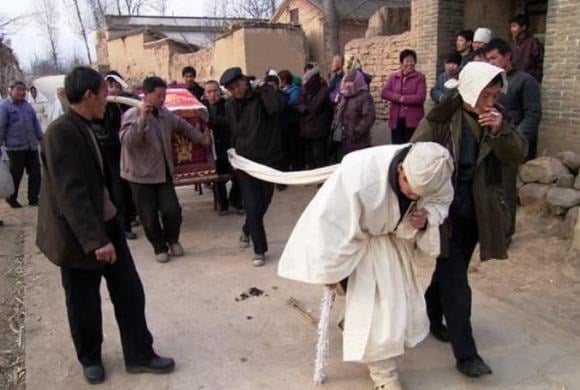Rain During Burial: A Negative Omen in Folk Beliefs
The farewell ceremony for a loved one’s final resting place, especially the burial ritual, is always considered an important and solemn occasion.
However, according to traditional beliefs, if it rains during the burial and the rainwater soaks the coffin, this is seen as a bad omen. The saying, “rain on a coffin brings lifelong poverty,” suggests that the rain at this moment could bring misfortune, hardship, and poverty to future generations.

The farewell ceremony for a loved one’s final resting place is an important and solemn occasion.
The origin of this belief may stem from the fact that coffins, usually made of wood, will decay and not last long if they become waterlogged. In ancient culture, the coffin was likened to the “home” of the deceased, so any damage caused by rainwater was seen as a sign of imperfection, similar to a leaky and dilapidated house. This worried the living, who felt that the deceased had not found peace.
Moreover, rainy weather during the farewell ceremony not only complicates the ritual but can also disrupt transportation and increase the risk of accidents or unwanted incidents, causing further anxiety and unrest for the family. Folk beliefs hold that an unfavorable funeral may cause the soul of the deceased to be restless and unable to bless their descendants, leading to future troubles for the family.
Rain on the Grave: A Sign of Prosperity and Blessings
In contrast to the negative beliefs about rain during burial, if it rains after the burial and the rainwater falls on the grave that has been covered with soil, this carries a positive meaning.
The saying, “rain on the grave brings riches for generations,” indicates that the rain signifies the deceased’s contentment and brings blessings to their descendants. Folk beliefs interpret this as a sign that the family will prosper, the children will be successful, and life will be abundant.

In contrast to the negative beliefs about rain during burial, rain after the burial on the grave has a positive meaning.
In ancient beliefs, the rain cooling the grave was seen as a symbol of freshness and vitality, like a blessing from the soul of the deceased. A grave cleansed by rainwater and covered with moist soil represented the peaceful rest of the departed, from whom they could then receive blessings for their descendants’ success and a harmonious and prosperous family life.
Filial Piety in Traditional Beliefs
Although these folk beliefs lack scientific basis, they emphasize the importance of filial piety and respect for ancestors. The ancients believed that tending to graves was not only a responsibility but also a way to maintain the family’s fortune. Keeping the graves clean and well-maintained ensured the peace of the deceased and expressed deep gratitude, a core value in the spiritual life of the Vietnamese.
The saying, “rain on a coffin brings lifelong poverty, but rain on the grave brings riches for generations,” reflects not only folk beliefs but also reminds us of the importance of maintaining our ancestors’ graves. It is also a way for descendants to express their remembrance and maintain the connection between generations.
Modern Perspective on Folk Beliefs
Today, phenomena such as rain during funerals or on graves are scientifically understood as natural occurrences without spiritual significance. However, the cultural and moral values behind these beliefs are still respected by many.
In modern society, tending to ancestral graves is less about spiritual beliefs and more about expressing gratitude and filial piety. While the belief in “rain on the grave” or other signs may fade, the moral lesson of responsibility towards ancestors and family remains a lasting value, contributing to the cohesion of generations within a traditional family unit.
The Ancestors’ Admonition: “7 Don’t Bury Your Father, 8 Don’t Bury Your Mother” — A Reminder for the Descendants.
The ancient proverb, “7 does not bury their father, 8 does not bury their mother,” is a mysterious saying that has puzzled many. It is a phrase that requires deep insight and understanding to truly grasp its meaning. This intriguing proverb hints at a profound message about life, death, and the passage of time.
The Ancient’s Wisdom: “7 Won’t Bury the Father, 8 Won’t Bury the Mother” – Unraveling the Mystery
“Burying a parent is one of the toughest moments in life, and the old adage, ‘7 won’t bury their father, 8 won’t bury their mother’ is a poignant reminder of the complexities of life and death. This proverb, passed down through generations, holds a deeper meaning that isn’t always readily understood.”


































